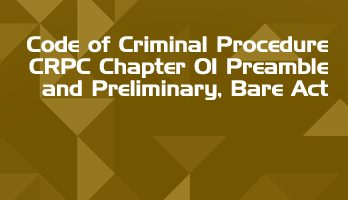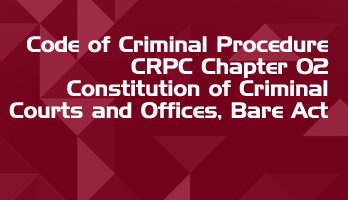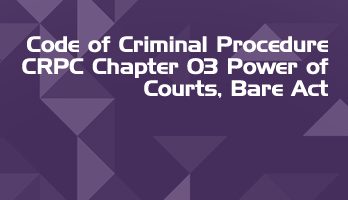A 'Bare act' is the actual legislation passed by the Parliament of India. Generally, an act sets out the high level legal and policy principles applicable to the subject matter of the law.
Most acts are accompanied by 'subsidiary legislation' such as rules, regulations, notifications and orders; which address the actual implementation detail of the act.
Free Full Course Available on LawMint's YouTube Channel
How to Land Your Dream LLB Internship in a Top Law Firm
- Part 1 - Introduction
- Part 2 - Internship Planning
- Part 3 - Internship Research
- Part 4 - Building Your Profile
- Part 5 - The Email
- Part 6 - The Resume
- Part 7 - The Cover Letter
- Part 8 - The Interview
- Part 9 - Self Development
Practical and comprehensive course, with real examples and step-by-step analysis of the complete internship application process. Check out LawMint's YouTube channel now!
Code of Criminal Procedure, 1973
Chapter 35 – Irregular Proceedings
Section 460 – Irregularities which do not vitiate proceedings
If any Magistrate not empowered by law to do any of the following things, namely:
- to issue a search – warrant under section 94;
- to order, under section 155, the police to investigate an offence;
- to hold an inquest under section 176;
- to issue process under section 187, for the apprehension of a person within his local jurisdiction who has committed an offence outside the limits of such jurisdiction;
- to take cognizance of an offence under clause (a) or clause (b) of Sub – Section (1) of section 190;
- to make over a case under Sub – Section (2) of section 192;
- to tender a pardon under section 306;
- to recall a case and try it himself under section 410; or
- to sell property under section 458 or section 459, erroneously in good faith does that thing, his proceedings shall not be set aside merely on the ground of his not being so empowered.
Section 461 – Irregularities which vitiate proceedings
If any Magistrate, not being empowered by law in this behalf, does any of the following things, namely:
- attaches and sells property under section 83;
- issues a search – warrant for a document, parcel or other thing in the custody of a postal or telegraph authority;
- demands security to keep the peace;
- demands security for good behaviour;
- discharges a person lawfully bound to be of good behaviour;
- cancels a bond to keep the peace;
- makes an order for maintenance;
- makes an order under section 133 as to a local nuisance;
- prohibits, under section 143, the repetition or continuance of a public nuisance;
- makes an order under Part C or Part D of Chapter X;
- takes cognizance of an offence under clause © of Sub – Section (1) of section 190;
- tries an offender;
- tries an offender summarily;
- passes a sentence, under section 325, on proceedings recorded by another Magistrate;
- decides an appeal;
- calls, under section 397, for proceedings; or
- revises an order passed under section 446, his proceedings shall be void.
Section 462 – Proceedings in wrong place
No finding, sentence or order of any Criminal Court shall be set aside merely on the ground that the inquiry, trial or other proceedings in the course of which it was arrived at or passed, took place in a wrong sessions division, district, sub – division or other local area, unless it appears that such error has in fact occasioned a failure of justice.
Section 463 – Non – compliance with provisions of section 164 or section 281
- If any Court before which a confession or other statement of an accused person recorded, or purporting to be recorded under section 164 or section 281, is tendered, or has been received, in evidence finds that any of the provisions of either of such sections have not been complied with by the Magistrate recording the statement, it may, notwithstanding anything contained in section 91 of the Indian Evidence Act, 1872 (1 of 1872), take evidence in regard to such non – compliance, and may, if satisfied that such non – compliance has not injured the accused in his defence on the merits and that he duly made the statement recorded, admit such statement.
- The provisions of this section apply to Courts of appeal, reference and revision.
Section 464 – Effect of omission to frame, or absence of, or error in, charge
- No finding sentence or order by a Court of competent jurisdiction shall be deemed invalid merely on the ground that no charge was framed or on the ground of any error, omission or irregularity in the charge including any misjoinder of charge, unless, in the opinion of the Court of appeal, confirmation or revision, a failure of justice has in fact been occasioned thereby.
- If the Court of appeal, confirmation or revision is of opinion that a failure of justice has in fact been occasioned, it may
- in the case of an omission to frame a charge, order that a charge be framed and that the trial be recommenced from the point immediately after the framing of the charge.
- in the case of an error, omission or irregularity in the charge, direct a new trial to be had upon a charge framed in whatever manner it thinks fit: Provided that if the Court is of opinion that the facts of the case are such that no valid charge could be preferred against the accused in respect of the facts proved, it shall quash the conviction.
Section 465 – Finding or sentence when reversible by reason of error, omission or irregularity
- Subject to the provisions hereinbefore contained, on finding sentence or order passed by a Court of competent jurisdiction shall be reversed or altered by a Court of appeal, confirmation or revision on account of any error, omission or irregularity in the complaint, summons, warrant, proclamation, order, judgment or other proceedings before or during trial or in any inquiry or other proceedings under this Code, or any error, or irregularity in any sanction for the prosecution unless in the opinion of that Court, a failure of justice has in fact been occasioned thereby.
- In determining whether any error, omission or irregularity in any proceeding under this Code, or any error, or irregularity in any sanction for the prosecution has occasioned a failure of justice, the Court shall have regard to the fact whether the objection could and should have been raised at an earlier stage in the proceedings.
Section 466 – Defect or error not to make attachment unlawful
No attachment made under this Code shall be deemed unlawful, nor shall any person making the same be deemed a trespasser, on account of any defect or want or form in the summons, conviction, writ of attachment or other proceedings relating thereto.
Important Central Acts in Regional Languages
Legislative department website also features regional language versions of several important Central Acts.
Free Full Course Available on LawMint's YouTube Channel
How to Land Your Dream LLB Internship in a Top Law Firm
- Part 1 - Introduction
- Part 2 - Internship Planning
- Part 3 - Internship Research
- Part 4 - Building Your Profile
- Part 5 - The Email
- Part 6 - The Resume
- Part 7 - The Cover Letter
- Part 8 - The Interview
- Part 9 - Self Development
Practical and comprehensive course, with real examples and step-by-step analysis of the complete internship application process. Check out LawMint's YouTube channel now!












